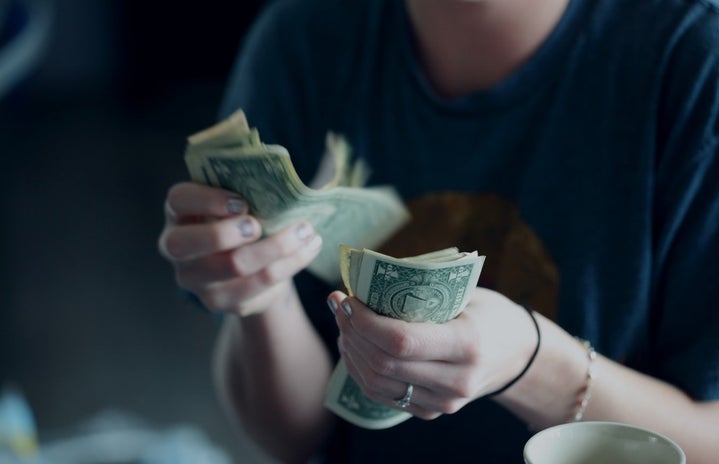According to the Climate Clock, we have about twelve years until we reach the dangerous point of a 1.5-degrees-Celsius change in climate, which will result in rising sea levels, droughts, floods, ecosystem destruction, and species extinction.
From this emergency, many eco-friendly and zero-waste social media influencers, like @impactforgood and @zerowastenerd have emerged. However, as is often the case with influencers, they often portray a life that seems out of reach for many: promoting expensive plastic-free products and ethical, higher-quality brands or buying all of their groceries from the farmer’s market. For the broke college students among us who want to be better to the Earth, these people can make the task seem daunting.
The good news is this: living a more sustainable life does not have to break the bank. In fact, it can even save you money! Here are my five best tips for cleaning up your habits without cleaning out your wallet.
1. Limit your consumption
Let’s state the obvious: buying a lot and eventually throwing it all away is bad for both your bank account and your planet. Cutting back shopping is easier said than done, but there are some easy ways to do it. Choose your local library over purchasing books, avoid impulse buying (sorry Target dollar section!), repair broken items instead of replacing and start to recognize the difference between necessity and desire.
Every time I’m about to check out at the store, I look through my haul and ask myself, “if I don’t buy these things, will my life be considerably and noticeably worse?” If the answer is no, I consider putting some things back.
Buying less does take practice as consumerism is a hard habit to break. But it will not only better the environment, it will improve your life by reducing clutter and giving you a greater appreciation of what you do have.
2. Thrift
My one vice is clothes shopping, but it is detrimental to the environment. Fast fashion–brands like Forever 21 and H&M that produce cheap, low-quality, and trendy clothing–is the second most polluting industry in the world after oil. When I realized the pollution my clothing addiction caused, I made the switch to thrifting. Buying used clothes keeps them out of landfills and reduces the demand for new clothing production.
When it comes to sustainable shopping, there’s a hierarchy of environmental-friendliness. Start by reworking the clothes in your own closet (cropping, dying, painting, etc.) to avoid buying new altogether. Trade some of your unused clothes with friends, shop at your local thrift stores in person, and then thrift online through sites like Depop, Poshmark, and Thredup.
3. Say ‘No!’ to single-use plastics
You can avoid plastics like cups, straws, and utensils while eating out as a free way to better the environment, but it may require some preparation. If you are a straw kind of gal, consider purchasing some metal straws to put in your bag when you go out. Invest in a reusable utensil kit and water bottle–both of which can run you less than $10 each–and make it easier to say no when eating out.
4. Buy a bamboo toothbrush
Did you know that every single toothbrush you’ve ever used is still in a landfill? Gross, I know. According to Foreo, North America throws away 1 billion toothbrushes a year. That’s enough to wrap around the Earth four times over. I assumed bamboo toothbrushes were far more expensive than normal toothbrushes, but you can get a four-pack on Amazon for only $6.

Not only will you feel better throwing away your bamboo toothbrush knowing it will biodegrade after a few years (as long as you make sure to remove the plastic bristles with some pliers beforehand), but it also looks so much cuter on your bathroom counter than that ugly, old, plastic one.
5. Invest in reusable grocery bags

There is nothing more annoying, cluttering and suffocating than that huge collection of plastic grocery bags overflowing out of that one kitchen drawer–you know the one. As with any single-use plastic, they are terrible for the environment. Either invest in some reusable grocery bags (I suggest these large ones that can fold into a travel-friendly pouch) to avoid the collection altogether, or recycle your collection of plastic bags. Grocery stores like Kroger often have a recycling bin for old bags.
If you want to take it a step further, buy reusable produce bags to avoid those little plastic bags for fruits and vegetables, or avoid those bags altogether and keep your produce loose.
All in all, making these simple changes will not be enough to reverse climate change (we need serious legislative change for that). However, as someone who has employed most of these changes myself, I can guarantee they will lead to a more personally fulfilling, clean and ethical lifestyle. One person can only do so much, but if more people just do their best, we may achieve a better and cleaner planet.



